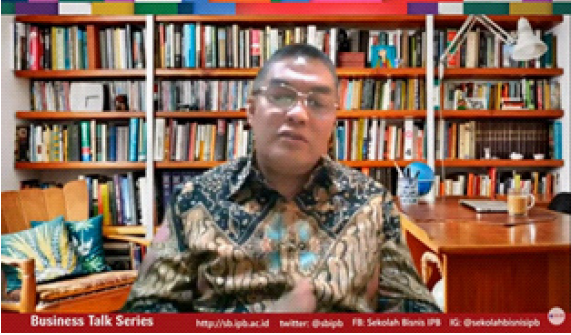The School of Business (SB-IPB) again held the 9th Online Business Talk Series (BTS) which was attended by around 150 participants on Wednesday, September 9, 2020. This webinar presented two speakers who were also alumni of the SB IPB DMB, namely Dr. Bambang Siswaji who delivered the topic “Investment Approach to Support the Recovery of Economy Affected by Covid-19” and Dr. Irvandi Gustari, SE, MBA which discusses “Effectiveness of Strategic Leadership in Crisis Management”.
The name of this article is:
The webinar was opened by the moderator, namely Asaduddin Abdullah, MSc who is a SB-IPB Lecturer at exactly 13.00 WIB. The event began with the appearance of IPB and SB-IPB profile videos, then remarks by Prof. Dr. Noer Azam Achsani, MS as the Dean of SB-IPB, and continued with the presentation of the two speakers.
The name of this article is:
President Director of PNM Investment Management, Dr. Bambang Siswaji started his presentation by showing a circular flow of income and explaining that GDP growth is currently declining, causing a contraction in the second quarter of 2020. The decline in the world economy was already felt before the pandemic from 3.6% to 2, 9% in 2019. In his discussion, he also emphasized the importance of knowing the causes of the crisis so that he can handle it properly. He focuses on the scope of companies, the labor market, households, and the market for goods and services because they represent real sector activities, reflect production activities, and real income from this sector. The flows that can increase volume are investment, government spending, and exports, which are then called injection. Meanwhile, the flows that reduce volume are savings, taxes, and imports, which are then called leakages. The occurrence of contraction indicates that during this pandemic, injection is less than leakages.
The name of this article is:
Pak Bambang also explained that there had been a negative multiplier effect during the Covid-19 pandemic. This has a successive impact on all areas of business because it is related to one another. At times like this, it also triggers an increase in unemployment which will create vulnerabilities if not addressed immediately. The government has made solutions, one of which is the Economic Recovery Program in terms of expansionary fiscal policy, monetary policy by BI, and financial institutions. This program is budgeted for 695.2 trillion rupiahs for health, social, sectoral, MSMEs, business incentives, and corporate financing. Based on this, it is hoped that financial institutions can continue to support investment in corporations, and consumption and production are expected to survive or even increase.
The name of this article is:
In current conditions, the main challenge that must be faced and corrected is low consumer confidence. Consumer confidence has the potential to increase or the possibility of spending when watching the economy increase, the capital market index increases, and the main problem is that this pandemic is reduced. Therefore, the government must be the main manager of the program well. The program being designed must be clear and its targets must also be clear. The government can also be more active in making direct investments in health, agriculture, tourism, simple housing, and infrastructure to convince consumers because these sectors will stimulate an increase in GDP.
The name of this article is:
He also explained related investment in the capital market, investment risks, and benefits of mutual funds. Investing during a pandemic has the potential to trigger positive sentiment in the community. This is reinforced by his explanation that the capital market index will grow in correlation with GDP growth. So, now is the right time for investors to enter. In essence, the government needs to work with various parties to restore consumer and business confidence. He even added that this pandemic could be used to reset the economy and revive it based on competitive, environmentally friendly, and social advantages.
The presentation was continued by Mr. Irvandi. It begins with an explanation regarding Indonesia’s current economic growth which is minus since December 2019 at -1.74 percent and continues to decline until June 2020 by 4.19 percent. This negative growth indicates that Indonesia could experience a prolonged recession. However, this situation should not make people give up. Indonesia’s economic decline is not as bad as other countries it is still better than that of neighboring Malaysia. In this crisis there are three questions, he explained. What do we want to do now? What can we do now? The condition when we don’t know what to do? Uncertainty in this crisis condition requires tactical leadership methods. Leadership styles are generally divided into three, namely authoritarian, participative.
The name of this article is:
Among the many types of leadership that can be formed, this way of leadership







Recent Comments